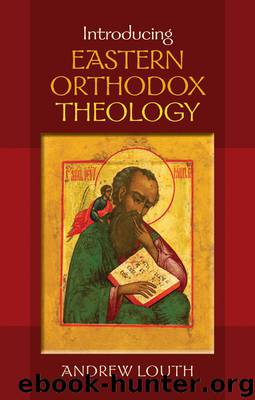Introducing Eastern Orthodox Theology by Andrew Louth

Author:Andrew Louth
Format: epub
Publisher: SPCK
Open to me, O Giver of Life, the gates of repentance: for early in the morning my spirit seeks your holy temple, bearing a temple of the body all defiled. But as you are compassionate, cleanse it by your loving-kindness and mercy.11
In the last century, a monk of the Holy Mountain, the Russian peasant who is now known to the world as St Silouan, wrote a meditation on Adam called ‘Adam’s Lament’.12 He begins by speaking of ‘Adam, the father of mankind’ and sees the worst consequences of Adam’s sin and banishment from paradise in the fact that he was ‘widowed of the love of God’; as a result, ‘he suffered grievously and lamented with a great moan’. Adam, for St Silouan, is both an individual – now in paradise again – and a representative figure: representative of ‘the soul which has known God through the Holy Spirit but has afterwards lost grace [and] experiences the torment that Adam suffered … [the] aching and deep regret in the soul that has grieved the beloved Lord’.13
So the story of Adam is, for St Silouan, the story of love lost, the loss regretted and the love eventually regained: human love for God, because God’s love for us is constant, and unceasingly calls human beings back to him. One of the most poignant moments in the story of the Fall as Genesis relates it occurs when Adam realizes what he has done, discovers that he and Eve are naked, and they make for themselves aprons of fig leaves. ‘And they heard the voice of the Lord God walking in the garden in the cool of the day, and the man and his wife hid themselves from the presence of the Lord God among the trees of the garden’ (Gen. 3.8). They had walked with God in the garden in the time of their innocence, but now they hid themselves: their easy, unselfconscious intercourse with God was lost; their love for God had fled, they were afraid, and hid themselves.
It is that lost love that, for St Silouan, is the main consequence of Adam’s sin; and it is the restoration of that love that God seeks from then on. The expulsion from paradise, the nakedness, the toil needed to support themselves, even the pain of childbirth, are seen as ways in which God seeks to stir man’s conscience and bring him back to love. In ‘Adam’s Lament’, St Silouan explores the plight of Adam – the plight of each one of us – and he ends with us humans calling on Adam to help us, to show us the way back. But Adam is silent, and when he speaks it is only to say: ‘My children, leave me in peace. I cannot wrench myself from the love of God to speak to you … Trouble me not. I see the Mother of God in glory …’14 It seems bafflingly heartless. But in St Silouan’s account we humans go on pestering Adam, and he replies:
Download
This site does not store any files on its server. We only index and link to content provided by other sites. Please contact the content providers to delete copyright contents if any and email us, we'll remove relevant links or contents immediately.
Under the Banner of Heaven: A Story of Violent Faith by Jon Krakauer(1787)
The Early Centuries - Byzantium 01 by John Julius Norwich(1727)
The Amish by Steven M. Nolt(1560)
Taken by J. C. Owens(1554)
In Spirit and Truth (In Spiritu Et Veritate Series) by Reed Zoe(1542)
Play It as It Lays by Joan Didion(1500)
The Apogee - Byzantium 02 by John Julius Norwich(1433)
The Last Man in Russia by Oliver Bullough(1387)
David Sedaris Diaries by David Sedaris(1281)
A History of the Amish by Steven M. Nolt(1273)
The Dance of Change by unknow(1250)
Leaving the Witness by Amber Scorah(1239)
Fallen by unknow(1207)
Tears of the Silenced: A True Crime and an American Tragedy; Severe Child Abuse and Leaving the Amish by Misty Griffin(1190)
The Angel of Forest Hill by Cindy Woodsmall(1139)
Deep Blue by unknow(1135)
The Best of Amish Cooking by Phyllis Pellman Good(1130)
The Ariana Trilogy by Rachel Ann Nunes(1116)
Escape by Carolyn Jessop & Laura Palmer(1101)
